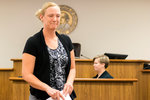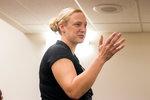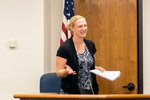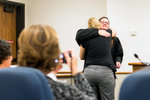



Like many caught in the cycle of addiction, Laura Kotula tried for years to get clean without success.
It took a screaming match with Lewis County Drug Court’s compliance officer Kevin Dickey — a constant presence who many drug court graduates credit for keeping them honest — to snap her out of her cycle of failure. It was the first step toward learning to deal with her emotions rather than run from them, she said.
“I didn’t like feelings or emotions … I didn’t know how to express them,” she said. “I stopped running. That’s when I started changing.”
On Friday, as she accepted a coin celebrating four years of sobriety about two years after graduating from Lewis County Family Recovery Court, she thanked the court, her counselors, social workers and many others involved with the program for helping her completely change her life.
“I didn’t see the truth. It was me. I was broken,” she said. “I was so full of hatred I couldn’t be a parent with open eyes.”
Kotula spoke Friday to a courtroom filled with Family Recovery Court’s three current participants and their supporters. The program lapsed for about two years, but started up again in August, said Stephanie Miller, manager of Lewis County’s Drug and Family Recovery courts.
“It’s building,” Miller said. “There’s interest in the program and we’re adding participants as quickly as we can.”
Miller took over the programs on Sept. 5. Before that, she was a community corrections officer in Oregon.
Family Recovery Court is a therapeutic court, similar in form to drug court but specifically geared to help parents with drug or alcohol addictions regain custody of their children.
Superior Court Judge Joely O’Rourke presides over Family Recovery Court. Partners in the program include the Washington State Attorney General’s Office — which represents the state in dependency cases rather than the Lewis County Prosecutor’s Office — the state Department of Social and Health Services, Child Protective Services, Centralia College, the Eugenia Center and Lewis County’s guardians ad litem, who represent the children.
Participants have weekly court appearances where they check in with O’Rourke in the presence of all of the program partners.
They are required to have regular drug screenings and get assistance from the agencies involved in finding work, housing, counseling and parenting classes.
The program is different from drug court in several important ways. Participants in drug court become a part of the program after an arrest and new criminal charges.
“This one starts with a petition being filed against a parent,” Miller said.
Parents in Family Recovery Court are not facing new charges as part of their participation in the program, but are working to maintain sobriety and regain their parental rights in child dependency matters.
Parents can work through child dependency proceedings without going through Family Recovery Court, but the program provides additional support and case management.
“You have more accountability and have more frequent judicial interactions,” Miller said. “You’re working more closely with a team … who want to see you find sobriety.”
Unlike a traditional court hearing, Family Recovery Court dates are informal. Participants are encouraged to talk about how they’re feeling in their recovery through friendly conversations with O’Rourke. Cheers and applause from supporters are encouraged, and the focus is shifted from determining guilt and punishment to finding a path toward rehabilitation.
“You are completely addressing things in a different way,” O’Rourke said. “You’re focusing on what do they need therapeutically.”
Before becoming a judge, O’Rourke previously has worked as both Lewis County’s Drug Court prosecutor and represented families in Family Recovery Court.
“I love it,” she said. “It’s a very positive experience.”
Kotula was born addicted to cocaine, she said, to parents who dealt drugs and taught her to tend the family’s marijuana grow at 9 years old.
“I was taught the family business,” she said.
The counseling she received and skills she learned through her time in Family Recovery Court helped her break free from that generational struggle with addiction, she said Friday. While she admits she was scared to leave recovery court and strike out on her own, she’s continued to be successful. Of her four children, she has maintained custody of her youngest son.
“Family drug court helped me learn who I am and love myself,” she said. “If you don’t love yourself, you can’t give your children love.”